BROWSE BY TOPIC
- Bad Brokers
- Compliance Concepts
- Investor Protection
- Investments - Unsuitable
- Investments - Strategies
- Investments - Private
- Features/Scandals
- Companies
- Technology/Internet
- Rules & Regulations
- Crimes
- Investments
- Bad Advisors
- Boiler Rooms
- Hirings/Transitions
- Terminations/Cost Cutting
- Regulators
- Wall Street News
- General News
- Donald Trump & Co.
- Lawsuits/Arbitrations
- Regulatory Sanctions
- Big Banks
- People
TRENDING TAGS
Stories of Interest
- Sarah ten Siethoff is New Associate Director of SEC Investment Management Rulemaking Office
- Catherine Keating Appointed CEO of BNY Mellon Wealth Management
- Credit Suisse to Pay $47Mn to Resolve DOJ Asia Probe
- SEC Chair Clayton Goes 'Hat in Hand' Before Congress on 2019 Budget Request
- SEC's Opening Remarks to the Elder Justice Coordinating Council
- Massachusetts Jury Convicts CA Attorney of Securities Fraud
- Deutsche Bank Says 3 Senior Investment Bankers to Leave Firm
- World’s Biggest Hedge Fund Reportedly ‘Bearish On Financial Assets’
- SEC Fines Constant Contact, Popular Email Marketer, for Overstating Subscriber Numbers
- SocGen Agrees to Pay $1.3 Billion to End Libya, Libor Probes
- Cryptocurrency Exchange Bitfinex Briefly Halts Trading After Cyber Attack
- SEC Names Valerie Szczepanik Senior Advisor for Digital Assets and Innovation
- SEC Modernizes Delivery of Fund Reports, Seeks Public Feedback on Improving Fund Disclosure
- NYSE Says SEC Plan to Limit Exchange Rebates Would Hurt Investors
- Deutsche Bank faces another challenge with Fed stress test
- Former JPMorgan Broker Files racial discrimination suit against company
- $3.3Mn Winning Bid for Lunch with Warren Buffett
- Julie Erhardt is SEC's New Acting Chief Risk Officer
- Chyhe Becker is SEC's New Acting Chief Economist, Acting Director of Economic and Risk Analysis Division
- Getting a Handle on Virtual Currencies - FINRA
ABOUT FINANCIALISH
We seek to provide information, insights and direction that may enable the Financial Community to effectively and efficiently operate in a regulatory risk-free environment by curating content from all over the web.
Stay Informed with the latest fanancialish news.
SUBSCRIBE FOR
NEWSLETTERS & ALERTS
Bank of America Named in Ponzi Lawsuit – Shades of JPMorgan and Bernie Madoff
by Howard Haykin
Today we learned that Bank of America named in a class-action lawsuit – accused of essentially aiding and abetting a $102 million Ponzi scheme committed by 5 individuals. The fraud dates back to at least 2011.
According to the lawsuit, BofA “lent the scheme an air of legitimacy,” in part by providing more than 100 accounts used to perpetrate the scheme. The bank is further accused of having failed to act on, or investigate, suspicious activity that threw up red flags. This included deposits of hundreds of thousands of dollars into accounts with relatively small, negative or nonexistent balances, followed by transfers within the same week to other accounts or investors seeking to cash out.
So, what’s the likelihood that Bank of America if found guilty, or at least agrees to settle the case by coughing up tens of millions? PRETTY GOOD, I’D SAY.
SHADES OF JPMORGAN AND BERNIE MADOFF. Today’s Ponzi scheme case brings to mind Bernie Madoff’s famed $65 billion Ponzi scheme, a crime he confessed to in December 2008 (and convicted in April 2009).
JPMorgan Chase had been the primary banker for Bernie Madoff’s fund from 1986 through 2008. And throughout those 22 years, JPMorgan Chase had an insider’s view of undoubtedly suspicious activity and transactions - i.e., the machinations of Madoff’s fraud. Fact is, we subsequently learned that at some point in this relationship, senior executives at JPMorgan Chase - along with many others outside the bank - became suspicious of Madoff and expressed serious doubts about the legitimacy of his investment business.
Yet, despite those suspicions and many more, JPMorgan Chase allowed Madoff to move billions of dollars of investors’ cash in and out of his Chase bank accounts right until the day of his arrest in December 2008 - although by then, the bank had withdrawn all but $35 million of the $276 million it had invested in Madoff-linked hedge funds, according to the litigation. [NYT Dealbook, 2/4/11]
And for years after Madoff’s conviction, JPMorgan Chase continued to steadfastly claim that it did not know about or in any way become a party to Madoff’s fraud – even though the bank stood at the “very center” of Bernie Madoff’s Ponzi scheme. It was only in late 2013 and early 2014 that JPMorgan owned up to the fact that it had failed to tell authorities about its suspicions of fraud at Madoff’s fund. And even as the bank cut its exposure to Madoff’s fund to minimize its losses in what ended up being a $17.3 billion Ponzi scheme, JPMorgan never shared its doubts with U.S. authorities.
In 2014, JPMorgan settled all its legal matters pertaining to Madoff’s Ponzi scheme. The bank agreed to pay $2.6 billion to settle various federal investigations and it agreed to pay more than $500 million to settle private actions. MIghty sums, but a relatively small price to pay - as the bank and its personnel were never criminally charged for failing to report their suspicions about Madoff's dealings.
FINANCIALISH TAKE AWAYS. Just as JPMorgan Chase had an insider’s view to the machinations of Madoff’s fraud, so too had Bank of America in its handling of the more than 100 accounts involved in the $102 million scheme. It’s just a matter a time before the facts come out and a verdict or settlement is reached. Although, however, might be years away.





